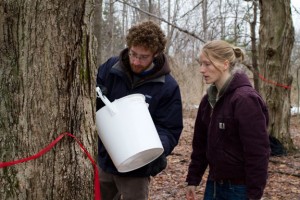While students across campus were frantically pulling all-nighters studying for midterm exams, freshmen Madeline Rublee and Jennie Ciota were pulling an all-nighter boiling sap to make maple syrup.

“We really wanted to do the night boil,” Rublee said. “It’s a lot like camping out — there was a campfire and everything. There really isn’t a lot of opportunities for an experience like that on the Ithaca College campus.”
The all-nighter Ciota and Rublee pulled was for the environmental studies course, Natural Resources and Ecology: Farming the Forest.
The course offers students the chance to not only produce their own maple syrup but also produce, market and sell mushrooms and honey. Taught by Jason Hamilton, associate professor of environmental studies and science, the course has only been around this semester, but variations have existed for more than five years.
Students in the class begin their class work indoors, growing oyster mushrooms. In February and March, students tap, boil and produce their own maple syrup. As the weather warms, students this semester will begin to grow shiitake mushrooms outdoors and build beehives for beekeeping and honey production. Most all of the products grown by the students are then marketed and sold based on current prices.
Hamilton, who plans to offer the course again in Spring 2012, said the mushroom production and beekeeping process will be facilitated by students as an independent study in the summer and fall.
Weeks earlier, Ciota and Rublee traveled to the college’s sugar bushes on South Hill to tap several maple trees for the boiling process of maple syrup production.
“A couple of weeks ago, we went down to the sugar bushes and drilled into the tress and put in a little spout on the hole and hung buckets,” Rublee said. “When the weather was right, the sap started flowing into the buckets. Now, we go down there to get the sap, and we hold it in storage tanks until they are full and ready for boiling.”
Hamilton said more than five years ago he and a student started experimenting with growing shiitake mushrooms on the college’s property in Newfield, N.Y., and eventually at the college’s Natural Lands on South Hill. In time, students began growing the mushrooms in both indoor lab facilities and outdoors at the college’s natural lands.
Hamilton said throughout the semester, the 21 students in the class gain an experience comparable to running a business.
“We have somewhere between 50 and 75 trees tapped right now,” Hamilton said. “[Students] have to go out and get the sap and then boil it and make the syrup. Then they have to go through the marketing and selling process, so they are really getting the whole process from start to finish.”
Hamilton said students from all academic backgrounds are welcome to take the course.
“It is about the relationship between humans and the environment,” Hamilton said. “In all of these systems people have to eat and live, so there has to be some sort of economic aspect. The students are really getting a holistic view of what environmental studies is about.”
Students not only produce products but also keep an updated blog.
As spring and summer approach, Hamilton said the next phase of the class will be to start producing honey.
Sophomore Hannah Whitehead, class bee manager, said because the class is just beginning to build the beekeeping infrastructure this semester, she does not expect the students taking the course as an independent study in the fall semester to produce large amounts of honey.
“We are not sure if we are going to get any honey, but we definitely hope we do get some,” she said. “But establishing healthy beehives is the real goal for now.”
Hamilton said besides the practical knowledge of growing and marketing, he hopes students will take away a deeper understanding of how to use resources around them later in life.
“What I want [students] to do is look at creative ways to look at the relationship between humans and the natural world and how is it that we as humans in the 21st century are going to live in this place and time,” he said.
Rublee said despite the long nights, the lessons from the class are more than worth the hours.
“Yeah, pulling that all-nighter was intense, but when you get to look at that bottle of golden syrup, it is totally worth it,” she said.
To read the class blog, visit www.icntfp.blogspot.com.







